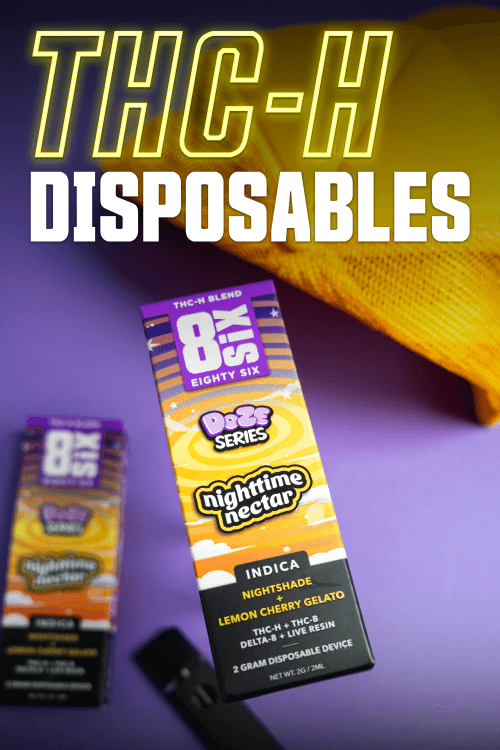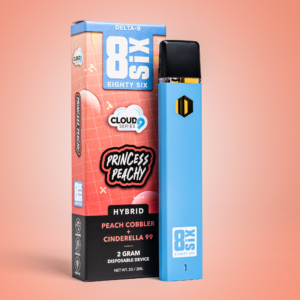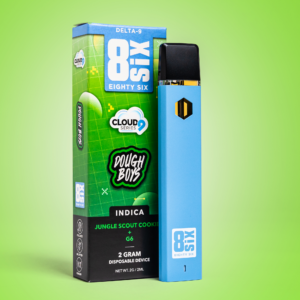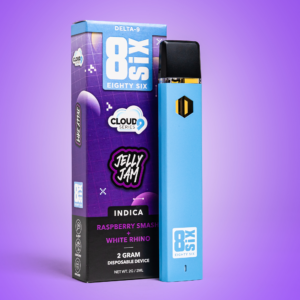Hemp-Derived THCa Explained – A Complete Guide to Diamonds
Everybody knows about Delta-9 Tetrahydrocannabinol (THC), right? In case you don’t, Delta-9 THC is the cannabinoid that’s widely known for making you feel “high” after using marijuana products. There’s also an ever-explosive popularity of the effects experienced after using minor cannabinoids such as Delta-8 THC, THCp, and HHC. But have you heard of THCa, the newest “it kid” on the block?
Here, we’ll explain THCa and explore how you might immediately fall in love with what the cannabinoid offers the next time you use Eighty Six products.
What is THCa?
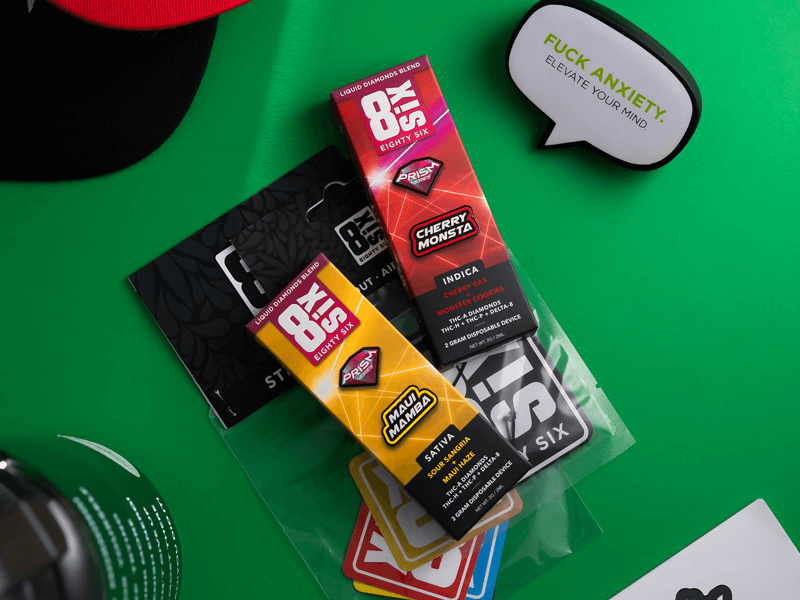
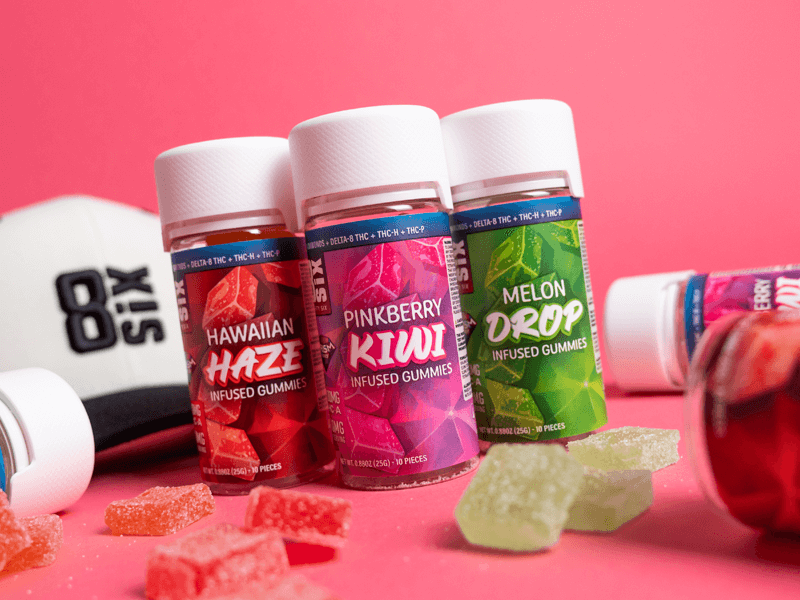
Short for tetrahydrocannabinol acid, THCa is one of the most common cannabinoids in both cannabis and hemp. Unlike regular THC, otherwise known as Delta-9 THC, THCa is non-psychoactive – in its raw form.
That’s because THCa is technically just the precursor to THC. It’s THCa that’s abundant in freshly harvested cannabis. Before it undergoes a decarboxylation process, THCa is non-intoxicating. When exposed to heat, a process called decarboxylation occurs. That’s when THCa converts into THC.
Hemp-derived THCa is synonymous with legal THCa products. They derive from hemp rather than marijuana. That makes it federally legal, and it’s how brands like Eighty Six can sell it across most of the country.
Thanks to its non-intoxicating base, THCa has garnered attention recently for its potential. It’s time to explain THCa and explore its potential in more depth.
Why ‘Hemp-Derived’ THCa?
The term “hemp-derived” THCa is used to specify the source of the THCa compound. Hemp, a variety of the cannabis plant, is naturally rich in cannabinoids, and for some hemp strains, that includes THCa.
Using the term “hemp-derived” indicates the brand that sources the THCa from rather than other cannabis varieties. These different varieties may contain higher levels of THC, which makes them illegal in certain states.
Explaining the difference between THCa types is critical, particularly in regions where hemp-derived products are legal. They’re regulated separately from cannabis-derived products due to differences in THC content.
Likewise, highlighting the hemp-derived nature of some THCa emphasizes its legality. That improves its accessibility to a broader audience who want to explore cannabinoids for wellness.
Is THCa Psychoactive?
Since THCa is the precursor of traditional Delta-9 THC, with its only differentiating factor being the presence of the carboxylic acid group, one would think its effects are just as close between the two, right?
In short, the explanation of THCa is not so simple.
The presence of the carboxylic acid group alters how our endocannabinoid system receives the THCa. The compound in its natural state will not get you high.
While they may seem similar, THCa and Delta-8 THC are two distinct cannabinoids. The two vary even down to their respective chemical structures. THCa is the acidic precursor to THC, while Delta-8 is a different isomer of Delta-9. THCa also contains a carboxylic acid group, which Delta-8 THC lacks.
In its raw form, THCa is non-intoxicating. It doesn’t produce any psychoactive effects. Only when converting it into THC through heat can you feel a high from it. Meanwhile, Delta-8 is outright psychoactive. Generally, though, it’s considered less potent than Delta-9 THC, the primary psychoactive component in pot. Altogether, the effects of Delta-8 are milder than traditional THC.
Hemp-derived THCa comes from hemp strains with minimal levels of THC. That makes THCa-rich products legal in regions where THC is otherwise prohibited. On the other hand, Delta-8 occupies a legal gray area in some jurisdictions. Its potential to cause intoxication causes a stir, though it is still hemp-derived.
Overall, the two cannabinoids differ. They have distinct chemical compositions, effects, and legal considerations. That makes them unique entities worth trying, and an explanation of THCa and other cannabinoids is critical.
Wait, So if THCa Doesn’t Get People High, What’s All the Hype For?
While THCa may be the hottest new kid on the block, the fact that the cannabinoid is in its natural state does raise reluctance to pay that higher ticket price – at least initially.
Heat must be applied to THCa to burn off the carboxylic acid group effectively. This chemical reaction then converts the THCa into Delta-9 THC.
In other words, you need to light the pre-roll or inhale away on one of our THCa Disposables to create this chemical reaction. The result is a more robust, exponentially more potent product.
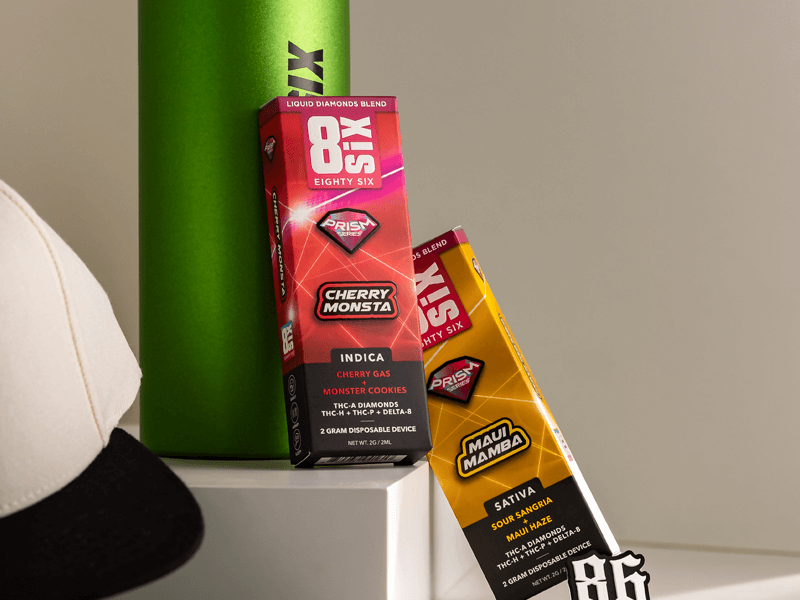
If Heat is Needed, How Does This Explain THCa Gummies?
Products like tinctures and gummies contain active hemp-derived THCa that is already decarboxylated. This pre-decarboxylated THCa is known as diamonds.

THCa diamonds are a type of extracted concentrate composed entirely of THCa. Their physical appearance resembles golden-looking crystals, hence the name.
Diamonds stand to be one of the purest THC-dominant extracts in the market, containing up to 99.9% THC once it’s heated and consumed.
Products such as THCa Gummies contain THCa diamonds alongside other cannabinoid distillates to effectively double or triple your dose.
What Makes THCa Different from Other Cannabinoids?
THCa stands out among cannabinoids for several distinctive reasons. Overall, these factors distinguish THCa from other cannabis compounds. This guide explains THCa’s unique properties and therapeutic potential.
How is THCa Different from Delta-9 THC?
Delta-9 is well-known for its psychoactive effects, including euphoria, relaxation, an altered perception of time, and more. In contrast, THCa is non-intoxicating, as it’s the raw form of THC. If you were to consume THCa in the raw plant, it wouldn’t get you high. Heating it to trigger decarboxylation is what you need. And then, THCa doesn’t get you high – the Delta-9 THC it becomes does.
Both THCa and Delta-9 THC are identical in terms of their chemical structure, with the former possessing an extra carboxylic acid group. The additional acid grouping explains THCa’s apparent advantage in helping users respond better to inflammation and neuroprotection.
Additionally, while traditional Delta-9 THC’s main benefits stem from its medicinal applications as a powerful anti-nausea treatment for chemotherapy patients, THCa may prove even more effective in it as less of the cannabinoid can achieve similar results.
How is THCa Different from CBD?
THCa and CBD share the same differences as the other two cannabinoids already mentioned. The two cannabinoids each have unique properties and their own array of potential benefits. Beyond chemical compositions, however, THCa and CBD vary even further. We’ll explain the difference between THCa and CBD here.
While THCa is non-intoxicating in its raw form, CBD is always non-intoxicating. CBD is a non-psychoactive compound and can’t produce a high, regardless of heat exposure.
Hemp-derived CBD products that contain 0.3% Delta-9 THC or less are legal under federal law. Meanwhile, the legality of THCa-rich products may vary depending on regional regulations.
Finally, the effects of THCa can happen faster than those of CBD. For many users, a consistent routine of CBD use allows one to see results over time. After approximately four weeks, you’ll notice the pronounced effects of the cannabinoid. Conversely, THCa hits as soon as it is heated. As THC, the effects are almost immediate.
Explaining the THCa Experience
Like any cannabinoid, the experience of consuming THCa varies from person to person. As THCa is explained and explored, remember that Individual differences in biology, tolerance, and dosage will cause different results.
THCa is non-psychoactive in its raw form, producing a high without heat. Consuming unheated THCa products will not result in a high, though it may have mild effects. Some consumers report a sense of relaxation and mild relief from specific symptoms like pain or inflammation. In addition, some users report feeling a general sense of well-being.
More research is necessary to explain and understand how THCa interacts with the body and brain.
But when THCa is heated, the cannabinoid is more effective and arguably more fun. That’s because THCa undergoes decarboxylation, converting it into THC through heat. In this activated form, THCa may produce the psychoactive effects you may be familiar with.
Activated THCa surges forth a sense of euphoria in some users. It stimulates intense relaxation and helps stabilize the mood. Some users react uniquely, so it’s good to start low and go slow to discover what THCa feels like for you. Increase the dosage as needed while monitoring your response to find your sweet spot.
THCa’s Therapeutic Benefits Explained
Much like the other cannabis & hemp cannabinoids, THCa possesses inherent effects regardless of whether it is decarboxylated into psychoactive Delta-9 THC or not.
Increased Relaxation
This one is a no-brainer. THCa, once it’s decarboxylated, converts to Delta-9 THC. And Delta-9 THC’s inherent effect is to deliver increased relaxation.
If you consume non-decarboxylated THCa, the relaxation will be minimal but present nonetheless. This effect can be explained as being closer to the effect cannabidiol, or CBD delivers – a minimal and non-intoxicating psychoactive buzz.
Natural Analgesic Against Physical Discomfort
Physical discomfort is primarily the result of inflammation. While research into cannabis and hemp-derived THCa is ongoing mainly, we do know that both THCa and traditional Delta-9 THC can help the body respond better to inflammation.
Safeguards Against Neurodegenerative Conditions
While other cannabinoids such as traditional Delta-9 THC and even other minor cannabinoids such as HHC have ongoing research on the subject, studies suggest THCa shows promise in delivering increasingly neuroprotective activity. Continued research will better explain THCa and its potential advantages.
Anti-Emetic Relief
As mentioned above, several cannabinoids possess inherent abilities to safeguard against nausea. THCa, in particular, is known for chemically converting into Delta-9 THC, which in turn exponentially increases its potency. Per this explanation, THCa may be more efficient in providing anti-emetic relief, as less would be needed to achieve the desired result.
The Typical Psychoactive Effects
Since THCa exponentially increases the potency of Delta-9 THC once decarboxylated, you can reasonably expect to feel ‘high.’
The typical effects of being high include, but are not limited to:
- Intense euphoria
- Increased relaxation
- Altered perception
- Stimulated appetite (aka The Munchies)
- Increased sedation and/or increased mental energy
Knowing these effects helps explain THCa and identify how it may affect you.

Does THCa Have Side Effects?
As with any substance, THCa may potentially cause side effects. However, they’re considered mild and less common compared to THC.
Some potential side effects of THCa consumption may include:
- Dry mouth
- Dizziness/lightheadedness
- Increased heart rate
- Sedation or fatigue
- Nausea or gastrointestinal discomfort
- Anxiety or paranoia
Rest assured, these side effects are normal and temporary. They vary from person to person, so you may not experience any side effects yourself.
How Does THCa Interact with Drugs?
In its raw form, THCa may not interact with prescriptions to the degree to which activated THC does. Regular THC can interact with nearly 400 prescription medications; however, not all of these interactions are severe. Some drugs that result in more severe interactions with THCa might include:
- Sedatives (or CNS depressants)
- SSRIs and/or antidepressants
- Anticoagulants
- Blood pressure medication
- Psychotropic medications (antipsychotics, mood stabilizers, etc.)
Users who are taking prescription medications should exercise caution before consuming THCa. Consult with your healthcare provider if you think you’re taking a prescription that may interact severely with THCa. Your provider should be able to discuss interactions with THCa and explain potential side effects. Continuously monitor for any signs of adverse reactions or changes in your medication if you begin combining with THCa or other cannabinoids.
What is the Legal Status of THCa?
As it stands, THCa is legal in 32 of the 50 states, along with Washington D.C, Guam, and Puerto Rico. Hemp-derived THCa falls as federally legal under the 2018 Farm Bill; however, your access to the cannabinoid is pooled alongside other hemp-derived compounds such as Delta-8, Delta-9, and THC-P. This means the state you live in may or may not have regulations and/or restrictions in place.
While its natural state is not inherently psychoactive, once the minor cannabinoid is heated up, it converts to Delta-9 THC, which might explain why THCa is still illegal in some jurisdictions. We urge you to err on the side of caution as you come across products infused with THCa, especially as it may be present in its natural state with the intent to be smoked. Once the THCa is decarboxylated and the Delta-9 THC potency skyrockets, it is highly likely that the finished product will be over the legal limit of 0.3%, thus making it illegal.
What are the Most Common Ways to Consume THCa?
If, after seeing THCa explained, you’re interested in trying it, there are several ways to get your hands on it. In a nutshell, THCa can be smoked, dabbed, vaped, eaten, taken sublingually, and even rubbed on your skin.
Smoked via THCa Coated Flower
A THCa-covered flower, known as a ‘Snowball,’ is exactly as it sounds – a flower coated in THCa. The final product looks a lot like a snowball. The user would break off a piece of the frosted flower, pack it into a bowl, or roll it into a pre-roll to be smoked. The heat of a flame can decarboxylate the THCa to be converted into a more potent THC high.
Legally speaking, the typical user wouldn’t be able to find these products as the decarboxylation process of the THCa would skyrocket the Delta-9 THC content well above the 0.3% legal limit. Nevertheless, these products are available somewhere.
Vaped as a Liquid Diamond Distillate Blend


Vaping THCa as a liquid diamond distillate blend is by far the most affordable and accessible way to consume the cannabinoid. Liquid diamonds are the extracted form of THCa that exists as a distillate. These are usually coupled with other psychoactive cannabinoids such as hemp-derived Delta-8 THC, Delta-9 THC, and other minor cannabinoids to mimic a full-spectrum blend one would typically experience with smoking marijuana flowers.
One of the other benefits of vaping hemp-derived THCa as liquid diamonds is the ability to attach strain-specific and/or botanically derived terpenes to effectively mask its natural aroma and deliver a more pleasing flavor. In fact, check out the PRISM Series THCa Disposables, two strain-specific flavors reconstructed to deliver Cherry Pie and Apricot Mimosa, respectively.
Eating THCa as an Edible
-
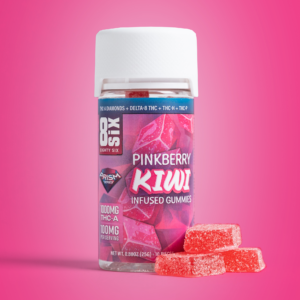 Pinkberry Kiwi 1000MG THCa Gummies$19.99 – $159.99
Pinkberry Kiwi 1000MG THCa Gummies$19.99 – $159.99 -
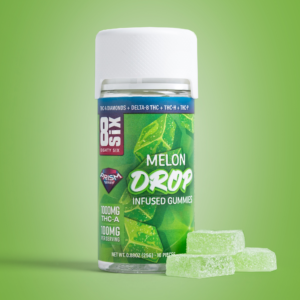 Melon Drop 1000MG THCa Gummies$19.99 – $159.99
Melon Drop 1000MG THCa Gummies$19.99 – $159.99 -
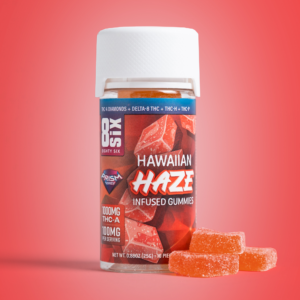 Hawaiian Haze 1000MG THCa Gummies$19.99 – $159.99
Hawaiian Haze 1000MG THCa Gummies$19.99 – $159.99
If inhaling cannabinoids into your lungs isn’t your vibe, eating edibles is a fantastic option. THCa-infused treats such as our THCa Gummies are historically a convenient and longer-lasting way to enjoy the cannabinoid.
Unlike smoking and vaping THCa, which would enter your bloodstream through your lungs, edibles must first be digested and processed through the liver. This means the onset time before you’d feel the effects is longer, but the result is longer-lasting. This also explains THCa edibles’ often more potent experience.
The PRISM Series also offers THCa Gummies in three flavors: Hawaiian Haze, Melon Drop, and Pinkberry Kiwi. Each 1000MG jar contains THCa Liquid Diamonds blended alongside Delta-8 THC, THC-P, and THC-H.
Eighty Six Brings You Quality You Won’t Find Anywhere Else
Whether you’re a seasoned user of alternative cannabinoids or reading this for the first time, Eighty Six has the products you need at the safety guarantee you demand. Our products prioritize flawless, lab-tested quality and transparency at every step of the process. We also explain THCa and other products to make you a more informed buyer. Shop the site and fall in love with your next favorite cannabinoid blend today.
Additional FAQs
How Long Does the High From THCa Last?
THCa does not produce a high on its own. When it is heated or decarboxylated, THCa is converted into THC, the psychoactive compound responsible for the high. Typically, this high lasts from a few hours to several hours. Dosage, tolerance, and consumption methods all influence the duration of the high.
Does THCa Show Up on Drug Tests?
Yes, THCa can show up on a drug test. While THCa itself is not psychoactive, it is converted into THC when heated. Once consumed, the body metabolizes THC into metabolites, which are what drug tests usually screen for.
Even if you consume raw hemp-derived THCa, there’s a chance it could be detected in a drug test. Drug test sensitivity, consumption methods, and metabolism rates also impact and explain THCa’s influence on a drug test.
How Does THCa Compare to THC-P?
Although both THCa and THC-P are cannabinoids, THCa is the non-psychoactive precursor to THC, which is produced after heating or decarboxylation. THC-P is a more robust form of THC with a higher affinity for the CB1 receptors in the brain. This means smaller amounts of THC-P can have stronger and longer-lasting effects than THC.
